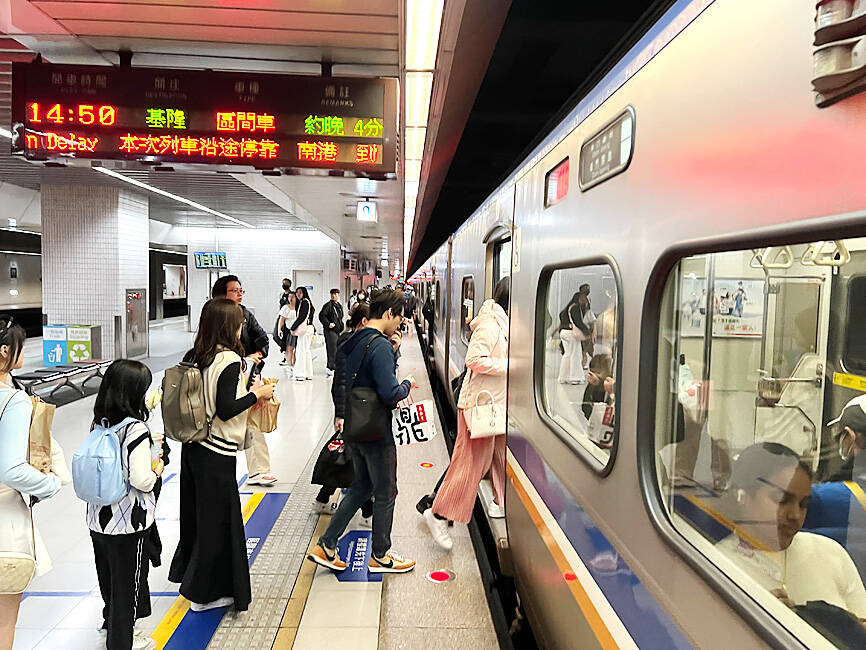Taiwan Railway Corp (TRC) is set to raise ticket prices for the first time in 30 years in late June, the acting chairman of the state-owned company said yesterday.
At a meeting of the legislature’s Transportation Committee meeting, TRC acting chairman Wu Sheng-yuan (伍勝園) confirmed the average fare increase of 26.8 percent has been reviewed by the Executive Yuan and would take effect on June 23, although the company has not yet formally announced the new prices.
The corporation is required to announce the fare changes at least one month before they take effect.

Photo courtesy of Taiwan Railway Corp
According to data previously released by TRC, the rate of the increase would taper off with distance traveled, meaning long-distance trips would see relatively smaller fare hikes.
For example, the fare for a Tze-Chiang express train from Taipei to Kaohsiung is to increase from NT$824 to NT$975 (US$24.93 to US$29.50) — an 18.33 percent rise — while a ticket on the same train between Taipei to Taichung will rise 33.6 percent from NT$375 to NT$501.
Passengers enrolled in the TPASS program would not see any changes to pricing and would continue to enjoy unlimited rides, the Ministry of Transportation and Communications said.
Wu said that while those who take short-distance train rides would be the most affected, those people mostly use TPASS and therefore their fares would not increase.
In addition, the fare from Taipei to New Taipei City’s Banciao District (板橋) would only increase by NT$7, still leaving it cheaper than the MRT or public buses, he said.
The fare adjustment was approved by the company’s board of directors in early February in a bid to reduce the company’s losses.
The firm last year recorded a deficit of NT$13.79 billion, including about NT$10.1 billion from railway operations.
The new fares are expected to boost the company’s annual revenue by more than NT$4 billion.
Meanwhile, high-speed rail fares are to remain the same as traffic volumes and revenue are continuing to increase, Wu said.
Two years after new stock is purchased and costs increase would be a more appropriate time to discuss pricing adjustments for the high-speed rail, he said.

Right-wing political scientist Laura Fernandez on Sunday won Costa Rica’s presidential election by a landslide, after promising to crack down on rising violence linked to the cocaine trade. Fernandez’s nearest rival, economist Alvaro Ramos, conceded defeat as results showed the ruling party far exceeding the threshold of 40 percent needed to avoid a runoff. With 94 percent of polling stations counted, the political heir of outgoing Costa Rican President Rodrigo Chaves had captured 48.3 percent of the vote compared with Ramos’ 33.4 percent, the Supreme Electoral Tribunal said. As soon as the first results were announced, members of Fernandez’s Sovereign People’s Party

MORE RESPONSIBILITY: Draftees would be expected to fight alongside professional soldiers, likely requiring the transformation of some training brigades into combat units The armed forces are to start incorporating new conscripts into combined arms brigades this year to enhance combat readiness, the Executive Yuan’s latest policy report said. The new policy would affect Taiwanese men entering the military for their compulsory service, which was extended to one year under reforms by then-president Tsai Ing-wen (蔡英文) in 2022. The conscripts would be trained to operate machine guns, uncrewed aerial vehicles, anti-tank guided missile launchers and Stinger air defense systems, the report said, adding that the basic training would be lengthened to eight weeks. After basic training, conscripts would be sorted into infantry battalions that would take

GROWING AMBITIONS: The scale and tempo of the operations show that the Strait has become the core theater for China to expand its security interests, the report said Chinese military aircraft incursions around Taiwan have surged nearly 15-fold over the past five years, according to a report released yesterday by the Democratic Progressive Party’s (DPP) Department of China Affairs. Sorties in the Taiwan Strait were previously irregular, totaling 380 in 2020, but have since evolved into routine operations, the report showed. “This demonstrates that the Taiwan Strait has become both the starting point and testing ground for Beijing’s expansionist ambitions,” it said. Driven by military expansionism, China is systematically pursuing actions aimed at altering the regional “status quo,” the department said, adding that Taiwan represents the most critical link in China’s

EMERGING FIELDS: The Chinese president said that the two countries would explore cooperation in green technology, the digital economy and artificial intelligence Chinese President Xi Jinping (習近平) yesterday called for an “equal and orderly multipolar world” in the face of “unilateral bullying,” in an apparent jab at the US. Xi was speaking during talks in Beijing with Uruguayan President Yamandu Orsi, the first South American leader to visit China since US special forces captured then-Venezuelan president Nicolas Maduro last month — an operation that Beijing condemned as a violation of sovereignty. Orsi follows a slew of leaders to have visited China seeking to boost ties with the world’s second-largest economy to hedge against US President Donald Trump’s increasingly unpredictable administration. “The international situation is fraught